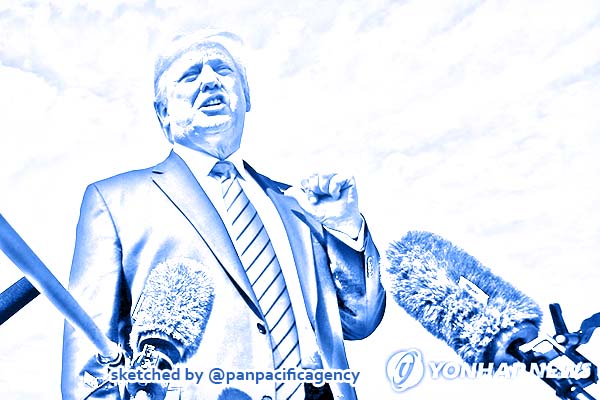[Analytics] US makes downgraded waves at ASEAN summit

This Reuters file photo shows U.S. President Donald Trump. (Yonhap). Sketched by the Pan Pacific Agency.
US Commerce Secretary Wilbur Ross pointed towards a potential “phase one” trade deal with China later this month while in Bangkok for the Association of Southeast Asian Nations (ASEAN) summit and related meetings, Asia Times reported.
“We’re in good shape, we’re making good progress, and there’s no natural reason why it couldn’t be,” Ross said in a Bangkok interview with Bloomberg Television monitored by Asia Times on whether a deal could be clinched this month.
“But whether it will slip a little bit, who knows. It’s always possible,” Ross said in the same television interview. He also said licenses for American companies to sell components to US-sanctioned Chinese telecom giant Huawei Technologies Company would be forthcoming “very shortly.”
At the same time, the US official sought to underscore America’s business commitment to Southeast Asia during his Thailand tour.
At an Indo-Pacific Business Forum staged on Monday (November 4), Ross emphasized in a statistics-heavy speech the extent of US investment in the region, saying that US President Donald Trump’s administration is “extremely engaged and fully committed” to the Indo-Pacific region.
“We will continue to negotiate trade deals with countries in the region,” Ross said in the speech. The privately-led event was attended by some 1,000 business and government officials, news reports said.
The US official did not entertain questions from the press on Monday but was due to hold a teleconference with reporters on Tuesday morning in Bangkok where US-China trade war-related questions are expected to feature prominently.
Trump’s national security adviser, Robert O’Brien, delivered a personal message from the US president at the same meeting offering to host a meeting of Southeast Asian leaders in the United States.
America’s commitment to the region was nonetheless in symbolic doubt with Trump’s absence at a summit attended by regional leaders, including Japanese Prime Minister Shinzo Abe, Indian Prime Minister Narendra Modi and Chinese premier Li Keqiang.
Rather than traveling to Bangkok for the summitry, Trump was seen instead on Saturday evening (November 2) attending a mixed martial arts event staged at Madison Square Garden in New York City.
That downgraded diplomatic delegation was reciprocated by national leaders in Bangkok who sent their foreign ministers or secretaries rather than personally attend an ASEAN-US summit held on Monday in Bangkok, a move news agencies referred to as a “partial snub.”
The Associated Press quoted an unnamed envoy who reportedly saw US diplomat correspondence saying that it was “extremely concerned” by ASEAN leaders’ “intentional effort to embarrass” Trump by not attending the meeting, which was hosted by O’Brien.
The same anonymous diplomat said the “full or partial boycott” would be “very damaging to the substance of ASEAN-US relations.” Thai Prime Minister Prayut Chan-ocha, the summit’s host, and the leaders of Vietnam and Laos attended the US-oriented event.
At the same time, O’Brien took a swipe at China, saying Beijing has used “intimidation” to stop ASEAN nations from exploiting energy resources worth as much as US$2.5 trillion in the South China Sea and that such tactic ran against “rules of respect, fairness and international law.”
“The region has no interest in a new imperial era where a big country can rule others on the theory that might makes right,” O’Brien said. “America is helping our ASEAN friends uphold their sovereignty.”
A week before the ASEAN summit, the US Trade Representative Office announced it would suspend Thailand’s duty-free privileges under the Generalized System of Preferences (GSP) on some $1.3 billion worth of Thai imports reputedly over labor rights issues.
The mostly symbolic move came soon after Thai legislators banned three agricultural chemicals that could act to bar US-grown soybean and other crop imports into the kingdom. Thailand’s potential loss of GSP privileges will affect less than half a percent of Thailand’s total exports and only 30% of its shipments under the GSP scheme, though seafood exports would be potentially be hard hit.
That’s raised questions about whether the US and Thailand are headed towards a wider trade tiff over Bangkok’s bulging trade surplus with the US and recent heightened US Treasury Department scrutiny of the management of Thailand’s baht currency after placing it on a “currency manipulator” watchlist in April.
Ross appeared to walk back the bubbling bilateral dispute during his speech, saying “the GSP issue has been blown way out of proportion. It’s no big deal.”
“There’s still time to renegotiate the underlying issue of workers’ rights,” Ross said, noting the suspension was not scheduled to take effect until April next year.